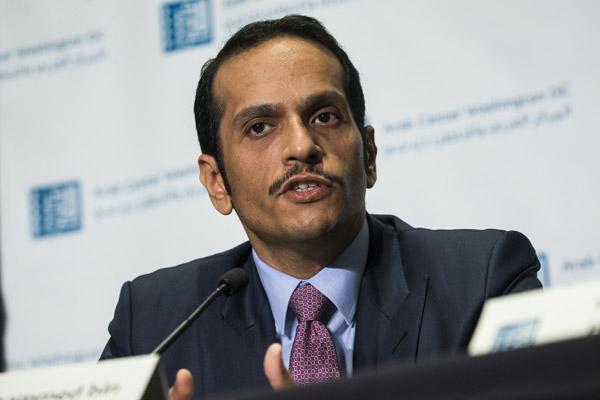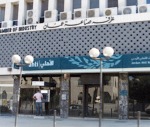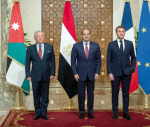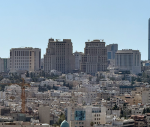You are here
Qatar signs counterterror deal as US looks to defuse Gulf row
By AFP - Jul 11,2017 - Last updated at Jul 11,2017

US Secretary of State Rex Tillerson and Qatari Foreign Minister Sheikh Mohammed Bin Abdulrahman Al Thani speak during a press conference in Doha on Tuesday (AFP photo)
DOHA — Qatar and the United States signed a deal Tuesday on combatting "terrorism" as visiting US Secretary of State Rex Tillerson pursued efforts to resolve the Gulf diplomatic crisis.
In Qatar as part of a series of Gulf meetings, Tillerson also said Doha had been "reasonable" in the dispute, which has seen Saudi Arabia, the United Arab Emirates, Bahrain and Egypt cut ties with the emirate over accusations it supports extremism.
Tillerson is spending much of this week in the Gulf seeking to mediate in the rift among crucial US allies, and will meet foreign ministers of the four countries isolating Qatar in the Saudi city of Jeddah on Wednesday.
After talks with senior officials in Doha on Tuesday, Tillerson and Qatari Foreign Minister Sheikh Mohammed Bin Abdulrahman Al Thani announced the deal targeting extremist financing.
“The memorandum lays out a series of steps the two countries will take over the coming months and years to interrupt and disable terror financing flows and intensify counterterrorism activities globally,” Tillerson said at a joint press conference.
He said the deal meant Qatar was “the first to respond” to US President Donald Trump’s call at a summit in Riyadh earlier this year “to stop the funding of terrorism” — suggesting that such deals could be signed with the other Arab states as a step towards ending the crisis.
‘Hopeful of progress’
Referring to its rivals, Sheikh Mohammed urged “the siege countries to join us in the future” by signing on to such deals.
While the State Department has warned the crisis could last months, Tillerson on Tuesday struck a moderately optimistic note.
“I’m hopeful we can make some progress to bring this to a point of resolution,” he said after meeting Qatar’s emir.
“I think Qatar has been quite clear in its positions and I think very reasonable and we want to talk now... [about] how do we take things forward.”
Tillerson flew back to Kuwait — the main mediator in the crisis and where he is based this week — after the talks in Qatar.
Egypt announced the meeting with Tillerson in Jeddah on Wednesday, saying it “reflects the four countries’ desire to enhance coordination and underscore their unity on ways to deal with Qatar in the future”.
The diplomatic crisis is the worst to hit the region since the establishment of the Gulf Cooperation Council in 1981.
The four countries on June 5 announced sanctions, effective immediately, against Qatar over accusations Doha supported extremism and was too close to Iran.
They severed all diplomatic ties, suspended transport links with Doha and ordered all Qataris to return home within 14 days.
On June 22, the Saudi-led bloc issued a list of 13 demands which, if met, would end the sanctions, including closing broadcast giant Al Jazeera, downgrading ties to Iran and shutting a Turkish military base in Doha.
Fresh tensions
Qatar refused to comply and has consistently denied accusations of ties to extremist groups.
Tillerson’s arrival in Doha was overshadowed by the publication of pre-existing confidential agreements between Qatar and other GCC states in which all sides had pledged to combat extremist funding and avoid interference in other states.
Publication of the accords, dated 2013 and 2014, caused both sides in the dispute to launch a fresh round of mutual accusations.
US broadcaster CNN aired leaked papers in which Saudi Arabia, Qatar and Kuwait — and later Bahrain and the UAE — had signed accords forbidding support for any opposition and hostile groups in their own nations, as well as in Egypt and Yemen.
A joint statement released by the Saudi-led bloc said the documents proved “beyond any doubt Qatar’s failure to meet its commitments and its full violation of its pledges”.
A statement from Doha’s Government Communications Office said the “siege” was “a clear violation” of the GCC’s charter and the agreements.
Tillerson’s visit is the latest in a series by officials to the region, including UN diplomats and the foreign ministers of Germany and Britain.
The United States and its Western allies have vast economic and political interests in the Gulf, which pumps one fifth of the world’s oil supplies, houses one third of proven global crude reserves and sits on one fifth of the world’s natural gas deposits.
Qatar is also home to the US military’s largest air base in the region, Al Udeid. Rival Bahrain houses the US Navy Fifth Fleet.
Related Articles
DUBAI — Kuwait on Thursday invited Qatar to a summit of Gulf countries next week, state media said, the first such invitation in a months-lo
RIYADH — US Secretary of State Rex Tillerson arrived in Riyadh on Saturday to attend a landmark meeting between officials from Saudi Arabia
DOHA — A deadline was approaching Sunday for Qatar to accept a series of demands made by several Arab states to lift a de facto blockade, wi

Opinion
Apr 07, 2025
Apr 07, 2025
Apr 07, 2025
Apr 06, 2025
- Popular
- Rated
- Commented
Apr 07, 2025
Apr 07, 2025
Apr 07, 2025
Newsletter
Get top stories and blog posts emailed to you each day.
















